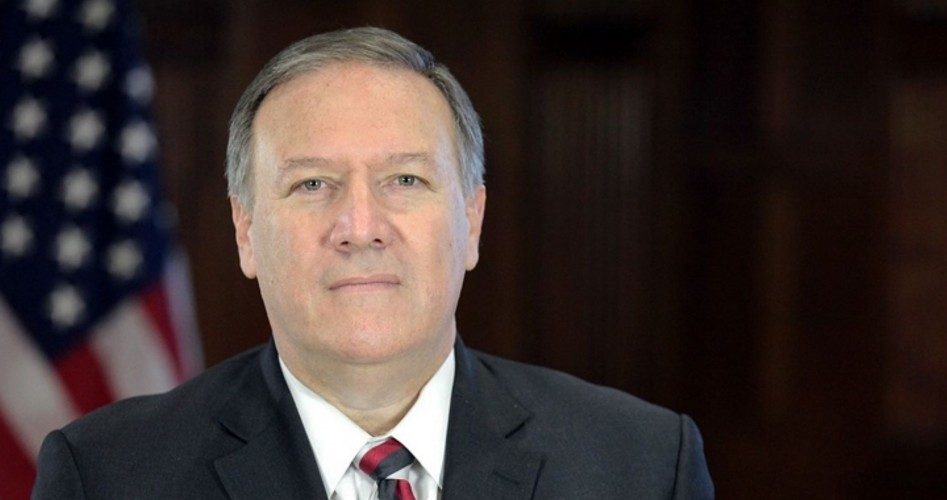
Speaking to reporters from his Mar-a-Lago club in Florida on April 18, President Trump was asked about Senator Rand Paul’s (R-Ky.) firm opposition to the president’s selection of CIA director Mike Pompeo (shown) for the cabinet post of Secretary of State. Trump replied, “I will say this about Rand Paul: He’s never let me down.”
CNN reported that after the president’s comments, Paul told reporters on Capitol Hill that the president called him a “few minutes ago” and asked for him to meet with Pompeo. Paul said that he agreed to meet with the nominee, adding: “I’m open to meeting right now and we’ll see what happens in the meeting.” Paul said that no date has been set for the meeting.
During a Senate confirmation hearing on April 12, the 21 members of the Senate Foreign Relations Committee, including Paul, had the opportunity to question Pompeo. Practically all of the confrontational questions during the hearing were presented by Democrats. Paul is the only Republican on the committee — and in the entire Senate — who has publicly stated that he opposes the CIA director for the position to head State.
{modulepos inner_text_ad}
A major thrust of Paul’s line of questioning was whether Pompeo is in agreement with the Trump administration’s aggressively interventionist policies in the Middle East. Paul suggested that Trump’s original intentions, reflected by his statements made while running for president, were good, but that he may be being influenced to move in the wrong direction by his advisors. The senator sought to determine if Pompeo would support Trump’s earlier noninterventionist statements, or join those who are steering him in the wrong direction.
“[Trump] says the Iraq war was the single worst decision ever made. So, once again, I’m concerned that you won’t be supporting the president,” Paul told Pompeo. “That you will be influencing him in a way that I think his inclinations are actually better than many of his advisors. That the Iraq war was a mistake that we need to come home from Afghanistan.
“He was against being involved in Syria at many times in his career,” Paul continued, referring to the president’s past statements which suggest he opposes “another Iraq war, bombing Syria without permission.”
Paul went on to refer to an exchange between Pompeo and another member of the committee, Senator Tim Kaine (D-Va.) He noted that the two had talked about whether or not the president has the authority to bomb President Bashar al Assad’s forces or installations in Syria and that Pompeo had replied that we have done that in the past.
The senator continued by saying that he didn’t think that was a complete enough answer. He said to Pompeo: “My question would be do you think it’s constitutional? Does the President have the constitutional authority to bomb Assad’s forces? Does he have the authority absent congressional action to bomb Assad’s forces or installations?”
Pompeo answered:
Senator, … I think I said this to Senator Kaine, I’m happy to repeat my view on this. Those decisions are weighted. Every place we can, we should work alongside Congress to get that but yes I believe the President has the domestic authority to do that…. I don’t think that has been disputed by Republicans or Democrats throughout an extended period of time.
Paul challenged Pompeo’s assertion, saying:
Actually, it was disputed mostly by our Founding Fathers who believed they gave that authority to Congress and actually [they were] uniformly opposed to the executive branch having that power. In fact, Madison wrote very specifically, he said, “The executive branch is the branch most prone to war. Therefore, we have with studied care vested that authority into the legislature.”
So the fact that we have in the past done this doesn’t make it constitutional and I would say that I take objection to the idea that the president can go to war when he wants, where he wants. With regard to Afghanistan, some have argued that it’s time to get out of Afghanistan. What do you think?
Pompeo answered:
Senator, I think the course of action that President Trump has taken there is the right one. It’s … humble in its mission. It understands that we’ve been there an awfully long time. It has an objective of leaving, but is not prepared to leave until such time as we can put America in a position where we can greatly diminish the threat to our homeland from terrorism that may emanate from there.
Paul moved on from Afghanistan to Syria. The hearing was held the day before our missiles actually stuck Syrian targets, so the discussion at that point was hypothetical.
Noting that Trump has said that the Iraq war was the single worst decision the United States ever made, Paul said to Pompeo:
Once again, I’m concerned that you won’t be supporting the president. That you will be influencing him in a way that I think his inclinations are actually better than many of his advisors. That the Iraq war was a mistake that we need to come home from Afghanistan.
He was against being involved in Syria at many times in his career. So [I] think he does have good instincts and my main concern is that will you be one who will listen to what the president actually wants instead of being someone who advocates for us staying forever in Afghanistan.
Another Iraq war, bombing Syria without permission. So, these are the advice you will give and I guess that’s my biggest concern with your nomination is that I don’t think it reflects the millions of people who voted for President Trump who actually voted for him because they thought it’d be different.
It was apparent that Paul went out of his way to give Trump the benefit of the doubt and took the president’s previous noninterventionist statements at face value. He attributed any deviation from those statements not to Trump having changed his mind, but to having received bad advice from his advisors. Though Paul did not name any of those advisors, they logically may include Defense Secretary Jim Mattis, former Secretary of State Rex Tillerson, and National Security Advisor John Bolton.
A day after the hearing, the United States unleashed its missiles against Syria installations that allegedly were responsible for a chemical weapons attack against Syrian civilians. Paul was among the senators who condemned the U.S. attack as being unconstitutional.
“While we all condemn the atrocities in Syria, the United States was not attacked,” Paul said in a statement after news broke that the United States had launched more than 50 Tomahawk cruise missiles on an airfield in Syria.
“The president needs congressional authorization for military action as required by the Constitution, and I call on him to come to Congress for a proper debate,” Paul said. “Our prior interventions in this region have done nothing to make us safer, and Syria will be no different.”
Paul has not said if he holds the president personally responsible for this violation of the Constitution, or if he attributes the action to bad advice from the president’s advisors. For the moment, it seems that the two have struck a truce where neither wants to attack the other.
If Paul becomes more strident in his criticism of the Trump military interventionism, will the president still maintain that the senator has never let him down? It will also be interesting to learn what Paul and Pompeo have to say to each other when they meet in the near future. If they do not strike an accord and Paul votes against Pompeo’s confirmation, then the only way he could be appointed would be for at least one Democrat to break ranks and vote for him.
Photo of Mike Pompeo in 2016: Office of the President-elect
Related articles:
Trump Names Neo-con Interventionist John R. Bolton as National Security Advisor
Mike Pompeo, Trump’s CIA Pick, Is No Civil Libertarian
The McMaster Cabal: Lead Operatives in the Deep State Coup Effort to Oust Trump



